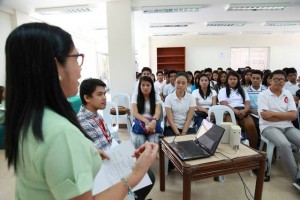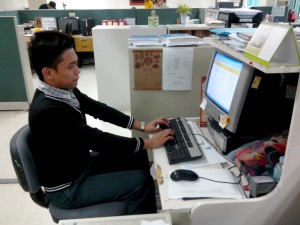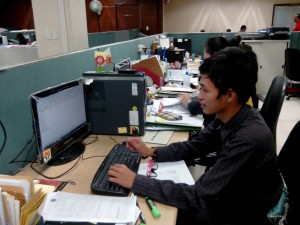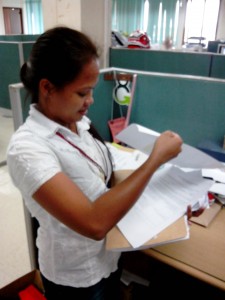
More than 500 youths participated in the recently-concluded Government Internship Program (GIP) implemented by the Department of Social Welfare and Development (DSWD) in its Central and 16 Field Offices.
Almost half of the GIP participants belonged to the household-beneficiaries of the Pantawid Pamilyang Pilipino Program while others were out-of-school and in-school youths. Pantawid Pamilya is the flagship poverty reduction program implemented by the national government through the DSWD.
The GIP started on April 21 and ran for 22 days. The participants were paid P300 per day.
Providing opportunity
The GIP is one of the components of the Kabataan 2000 program of the government, which provides opportunity for both out-of-school and in- school youths a hands-on experience of working in various government agencies.
The program enables them to learn life skills in the workplace, while earning money to help them meet their school needs. It is implemented during summer time when the youths are on vacation, thus, using their available time in a productive manner.
It introduces the youths to public service, serves as a recruitment mechanism for potential public employees, and extends possible financial assistance for their enrollment in the next school year.
The selected GIP participants were assigned in different offices at the DSWD central and field offices.
Big help

Darren Renz M. Reyes, 21, who stopped going to school for three years but returned last school year, said his being selected as one of the GIP participants this year is a stepping stone towards pursuing his studies.
“I plan to take up a course in Hotel and Restaurant Management,” she said.
Darren, the second of three children, narrated that they were abandoned by his mother when he was only nine years old. Since then, it has been their father who took care of them. Instead of being bitter and discouraged, he became determined to finish his studies. He even commended the GIP to be very helpful to their family since his older sister was also once a GIP participant in the Department.
“Gusto ko pong makatapos ng kolehiyo, makakita ng magandang trabaho at maging successful,” (I want to graduate from college, find a good job and be successful),” he added.
This dream is shared by Jhon Leonard Geraldo, 21, and a high school graduate.

Jhon Leonard Geraldo plans to take up a three-year course in Instrumentation, Control Engineering, and Technology at the Technological University of the Philippines (TUP).
“Hindi po karaniwan ang kursong ito, mahirap pero ‘pag naka-graduate ka ay madaling makapasok ng trabaho at malaki ang sweldo (This course is not ordinary, it is difficult. But once you graduate, it will be easy to find a job with a high salary),” he explained.
Jhon added that he already took and passed the entrance examination at TUP twice hoping that he will be able to go back to college.
“Huminto po ako ng pag-aaral pagka-graduate ko ng high school gawa ng kakapusan sa pinansyal (I had to stop schooling because of lack of financial resources),” he recounted.
Blessings
Through a stroke of luck, he met a former DSWD official who encouraged him to go back to school.
“Nangunguha po kami ng mangga sa puno sa kanilang bakuran nang sitahin niya kami. Tinanong niya po ako kung ilang taon na ako at kung nag-aaral pa ako. Sabi niya, merong GIP na programa ang DSWD na makatutulong samga out-of-school youth na katulad ko (We were picking mangoes from her backyard when she called our attention. She asked my age, and if I am still studying. She told me there is a GIP program of DSWD which helps out-of-school youths like me),” he said.
After his stint as a GIP participant, Jhon plans to work as a security guard to finance his education.
For Yshiedel P. Muncada, 19, of Bagong Silang, Caloocan City, and Charmine Vergara of Payatas B, Quezon City, it is a double blessing that their families are beneficiaries of Pantawid Pamilya making them qualified to join the GIP.
Yshiedel is taking up BS Elementary Education as a fourth year student this June, while Charmine plans to enrol in a two-year computer science course.
Yshiedel’s family is among the Set 1 beneficiaries of Pantawid Pamilya.
She expressed her gratitude for being part of the program because it will help her finish her studies
She said she enjoyed doing her tasks at the Crisis Intervention Unit (CIU) where she was assigned.

On the other hand, Charmine, 22, worked as a ‘kasambahay’ to be able to help her family.
“Pito kaming magkakapatid, 24 years old ang eldest at 14 naman ang youngest na nasa Grade 8. May sakit ang papa at mama namin kaya nagtatrabaho ako para mapag-aral ang aking mga kapatid (There are seven of us, the eldest is 24 years old while the youngest is 14 and is in Grade 8 this school year. Our parents are sick so I work to send my siblings to school),” she tearfully narrated.
No matter how hard her life may be, Charmine believes that poverty is not a hindrance to achieving one’s aspirations in life.
“When I graduate, I will look for a job and help my siblings finish school,” she ended.
Benefiting in-school youth
Aside from Pantawid Pamilya beneficiaries and out-of-school youths, GIP also assists indigent in-school youths to finish their studies.
Mary Jeane T. Lacaba, 19, is taking up Information Communication Technology (ICT) at Sta. Theresa’s College (STC).
“I applied as a GIP trainee because I want to experience working in a government office. The program is a big help to me and my family,” she stated.
This was echoed by Ma. Loudette O. Villar, 21, and a BS Office Administration student at the University of Caloocan City.
“Aside from continuing my studies, I also plan to take the Civil Service Exam. If I pass the sub-professional and professional exam, I will apply for a job in government,” Loudette shared.
Lessons learned
All six participants said that they learned a lot from the program, from interacting with employees and their fellow GIP trainees to office etiquette and procedures.
“We also saw that the common public perception regarding people working in government is not true,” they stated in unison.
“Nakita po namin kung paano magtrabaho ang mga empleyado ng DSWD, kung gaano sila kasipag at kasigasig sakanilang mga tungkulin (We saw how the employees of DSWD work, how hardworking and dedicated they are to their tasks).”
“We also felt that we are not treated differently. The employees treat us as if we are one of them, not mere GIP trainees,” they added.
Not just financial aid
Since its beginning in 2011, the program has helped 25,534 young people continue their studies and pursue their dreams of a better life.
Both public and private agencies have made various efforts for the creation of programs, activities and services for the youth.
According to DSWD Secretary Corazon Juliano-Soliman, the GIP is essentially recommended to empower and equip the youth for their future careers.
Significantly, the program serves as an arena for the aspiring youths, which eventually prepares them in the real battlefield of the labor force.
Moreover, it is not merely a program that provides financial aid or working experience in government offices, but a way of appreciating their skills, potentials, talents and contribution in nation building.
“Involving the youth in more meaningful endeavors paves the way for them to develop and acquire self-confidence and professionalism,” Sec. Soliman shared. ###


